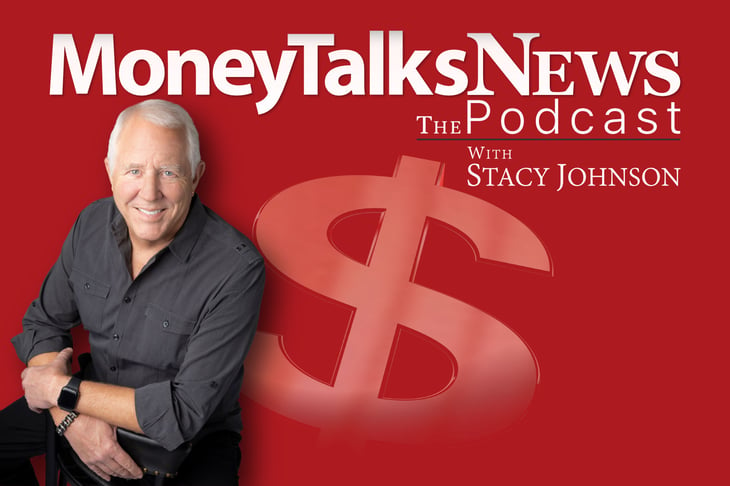
Editor’s note: This column is available to everyone, but if you’d like to learn more about the investments I make with my own money, then become a Money Talks News member. Not only does your membership support our journalism, you also get lots of additional benefits, like my columns, ad-free reading, free books, course discounts and much more. And it’s cheap: just $5/month. I hope my advice columns alone are worth that much! Learn more here.
I’ve been investing in stocks for more than 40 years. Along the way, I’ve made a few great moves, and many spectacularly dumb ones.
Following are three mistakes that I — along with countless other investors — have made in the past and now try my best to avoid. Dodge them, and you’ll be richer.
1. Not buying when stocks are on sale

Most investors love it when stocks are hitting new highs and hate it when they’re hitting new lows.
I get it. Obviously, we like feeling richer as prices rise. But we actually get richer by buying when prices are low and selling when prices are high. So, just as you might look forward to a sale at the mall, I look forward to horrible stock markets, because that’s when stocks are on sale.
Example: Take a look at my portfolio, and you’ll see I bought a bunch of stocks in 2009, near market lows. At the time, nobody — and I mean nobody — was suggesting stocks. Both stocks and housing sucked, and everyone was pretty much freaking out.
That’s when I bought a bunch of stocks and the house next door. Not because I’m a genius, but because I’d missed opportunities like this in years past by standing like a deer in the headlights.
It’s this simple: Buy quality companies when times are scary. As long as you believe the economy will ultimately rebound, you’ll eventually be rewarded. If you believe everything’s going to hell and the economy will never recover, buy a shotgun and canned food.
2. Not having patience

Buy a bush and plant it in your front yard. Stare at it every few seconds and before long you’ll believe you screwed up because you’re not seeing it grow. Then you might be tempted to rip it out and start over, or maybe even stop planting stuff altogether.
That’s not how to grow bushes … or money.
Success takes time. Make informed decisions, then be patient.
Earlier this year, the stock market was falling, which was no surprise to me, since it was horribly overvalued and inflation and interest rates were rising: both bad for stocks. Then, in June, many investors suddenly became convinced the Fed would soon pivot from raising rates to lowering them and the worst of the economic news was behind us.
For a while, it seemed they were right. From mid-June to mid-August, the Dow went up 14%.
But in my experience, it takes time to tame inflation and for stocks to recover. So rather than chase the rally and buy, I patiently waited. In fact, I used the summer rally to lighten up on stocks.
My patience paid off. In early September, the realization set in that interest rates aren’t falling anytime soon and the economy may be recession-bound. Stocks have been falling ever since.
As I mentioned above, I’m fine with that. As stocks get cheaper, I’ll be adding to my positions in companies I love, like Microsoft and Apple. Not yet, however. I’m in no rush.
3. Paying too much attention

Knowledge is power, and information creates knowledge. But too much information can be a bad thing if it makes you jumpy.
In order to survive, CNBC and other sources of news are required to “feed the beast” by breathlessly reporting on every nuance and opinion.
You don’t attract viewers with video of watching bushes grow. To prevent dead air, CNBC has to report every cloud, raindrop, puff of wind, new leaf and branch.
Never-ending blah, blah, blah is how they make money, but it’s not how you make money.
Guessing what’s going to happen in the next 10 days is a fool’s game. Forming an opinion as to what’s going to happen in the next 10 years, then acting on it, is how wealth is created.
Use information to create and confirm an investment thesis. Then sit back and stay put as long as your thesis still makes sense.
In 2001, I realized the Apple iPod was a consumer phenomenon, essentially the creation of a new paradigm. I put $1,700 into the stock. Over the next 20 years, there were myriad stories on CNBC and other sources suggesting it was time to ring the register.
I ignored the noise.
Twenty years later, I finally did sell some Apple, after my investment reached $800,000 and it became too large a part of my portfolio.
Bottom line? Read, watch and observe until you’re fairly confident you know what the heck is going on. But not so much that you develop an itchy trigger finger.
About me

I founded Money Talks News in 1991. I’m a CPA, and I have also earned licenses in stocks, commodities, options principal, mutual funds, life insurance, securities supervisor and real estate.
Should you choose to follow my advice, please note: I’ll tell you what I’m doing, but I’ll never tell you what you should be doing. I can’t, because I don’t know you. I’ve been doing this for a long time, but I’m definitely not always right. Not by a long shot. So do your own research, make your own decisions and be responsible for your own money.
Last but not least, check out my weekly “Money Talks News” podcasts. They’re brief, casual conversations with news recaps, as well as tips and tricks to make you richer.
You can listen right here on the Money Talks News website, or download them wherever you get your podcasts. Just look for Money Talks News, The Podcast with Stacy Johnson.
Check them out: You’ll be glad you did!




Add a Comment
Our Policy: We welcome relevant and respectful comments in order to foster healthy and informative discussions. All other comments may be removed. Comments with links are automatically held for moderation.